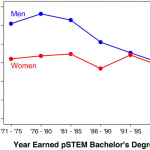Science
Oh, goody. Here's something we didn't need here in the US. While Australian skeptics have successfully been rallying to put a stop to a series of lectures from American antivaccine activist Sherri Tenpenny, we're going to have to put up with a far bigger name in quackery showing up right here in the good ol' U. S. of A. I'm referring to His Royal Highness, the Quacktitioner Royal, Prince Charles, the next King of England. Yes, in March he and Camilla will be here on a four day tour that will include a trip to Louisville to give the keynote address to a symposium on health and nature on March…
Phillip Ball has a long aggrieved essay about the Many-Worlds Interpretation, which is, as Sean Carroll notes, pretty bad. Ball declares that Many-Worlds is "incoherent, both philosophically and logically," but in fact, he's got this exactly backwards: Many-Worlds is, in fact, a marvel of logical and philosophical coherence, while Ball's objections are incoherent and illogical.
The fundamental problem with Many-Worlds is that every argument about it devolves very quickly into stoner dorm-room bull session nonsense about parallel worlds and identity and morality. But none of that is physics.…
I didn't see this before yesterday's post about Twitter, but over at SciLogs, Kirk Englehardt gets evangelical, offering a very chipper list of "Ten Reasons for Academic Researchers to Use Social Media." I'll just put the item headers here, though each of these has a more complete description, with links to lots of other stuff:
10. You’re in the Driver’s Seat
9. It’s About the Network
8. It’s Newsy and Trendy
7. Promotion (may) = Citations and Downloads
6. Spreading Your Love of Science
5. Setting the Record Straight
4. Sharing Interesting Things
3. Enhancing Your Research
2. It’s Easy
1. It…
You remember Dr. Bob, don't you?
I'm referring, of course, to Robert "Dr. Bob" Sears, the Capistrano Beach, CA pediatrician who's arguably the most famous of the antivaccine pediatricians who have been spreading fear, uncertainty, and doubt (FUD) about vaccines. (Sorry, Dr. Jay, but, regardless of your being Jenny McCarthy's son's pediatrician, I'd bet that more people have heard of Dr. Bob than have heard of you.) Dr. Bob has achieved this fame/notoriety based on his book, The Vaccine Book: Making the Right Decision for your Child, which is chock full of exaggerations about the dangers of…
I did! It was an origami microscope, with a single simple lens added. Here's what it looks like:
It's called a Foldscope, and I got it as part of a beta test program. It's a bit like the original Leeuwenhoek microscope, which you held up to your eye to see a magnified image.
The differences are that Leeuwenhoek used a drop of water to form a spherical lens; this comes equipped with a pre-printed lens. Leeuwenhoek used brass and little thumbscrews to move the specimen around; Foldscope comes on a sheet of thick paper, and you punch it out and fold it, and then move a slide around under the…
The AAAS annual meeting was last week, which apparently included some sessions on social media use. This, of course, led to the usual flurry of twittering about the awesomeness of Twitter, and how people who don't use Twitter are missing out. I was busy with other stuff, so I mostly let it pass, and of course I can't find representative examples now because Twitter.
The truth is, though, Twitter is kind of useless. Or, rather, it's only useful for certain kinds of things-- it's social media, and much more social than media.
So it's a great medium for talking to people you're not physically…
Over at Quantum Progress there was a recent series of guest posts about a social-justice-in-physics curriculum used by high school teacher Moses Rifkin. I sort of glanced at it, said "Huh, that's sort of interesting," and moved on, but this got picked up by some right-wing sites, and exploded. To the point where the awful people on Fox's awful morning show did a segment hating on it.
The angle of attack is, of course, that this is wasting time that ought to be spent on teaching physics. And, you know, I applaud Fox News's sudden concern for the teaching of physics-- if they'd like to have me…
Ever since the Disneyland measles outbreak hit high gear last month and permeated the national consciousness, the antivaccine movement has, justifiably, been on the defensive. We've been treated to the spectacle of a truly despicable cardiologist spewing antivaccine nonsense with an added dollop of contempt for parents of children with cancer who are worried about the degradation of herd immunity by non-vaccinating parents driving vaccine rates down, leading to pockets of low vaccine uptake. We've had antivaccinationists likening vaccine mandates to human trafficking and rape. Then, of…
That quote is from a good article in Nature on how sex is non-binary -- my only quibble would be with that "now". You'd have to define "now" as a window of time that encompasses the entirety of my training and work in developmental biology, and I'm getting to be kind of an old guy. Differences in sex development (DSDs) are common knowledge, and rather routine -- and coincidentally, I'm giving an exam on sex chromosome anomalies today.
The article works through a lot of basic concepts: chimeric sex, genetic vs. cellular vs. organismal sex, and the development of sexual characters. I was so…
Via Curt Rice (or, more precisely, somebody on Twitter who posted a link to that, but I didn't note who) there's a new study in Frontiers in Psychology of the STEM "pipeline", looking at the history of gender disparities in STEM degrees. You can spin this one of two ways, the optimistic one being "Women now continue on from bachelors degrees to Ph.D.'s at the same rate as men!" and the pessimistic one being, well, Rice's post.
The accurate description, as is often the case in social science, "This stuff is really messy and confusing." Rather than being a set of nice straight pipes going from…
It often comes as a surprise to proponents of alternative medicine and critics of big pharma that I'm a big fan of John Ioannidis. Evidence of this can easily be found right here on this very blog just by entering Ioannidis' name into the search box. Indeed, my first post about an Ioannidis paper is nearly a decade old now. These posts were about one of Ioannidis' most famous papers, this one published in JAMA and entitled Contradicted and Initially Stronger Effects in Highly Cited Clinical Research. It was a study that suggested that at least 1/3 of highly cited clinical trials may either…
We're having a brutal cold snap at the moment, and while today's early-morning dog walk was considerably warmer than yesterday's, it was still 0F/-18C out, which is way colder than I like. When I came back in the house after the walk, my glasses instantly fogged up. But I had to take some stuff outside for the recycling, and within a few seconds of stepping back outside, they cleared right back up.
Now, I knew that would happen (which is why I hadn't bothered to wipe them off inside), but in one of those physicists-are-a-little-weird moments, for the first time, it occurred to me to wonder…
SteelyKid is spending a couple of days this week at "Nerf Camp" at the school where she does taekwondo. This basically consists of a bunch of hyped-up kids in a big room doing martial activities-- taekwondo class, board breaking, and "Nerf war" where they build an obstacle course and then shoot each other with dart guns. Which, of course, required the purchase of upgraded Nerf weaponry, as seen in the "featured image" above.
This thing fires darts at a fearsome speed-- they hit the ceiling with really loud "thwack" that was a huge hit with both kids. Of course, you know what's coming next,…
The final bit of meta-blogging I'll do this weekend is another look at what survives from past years. Unfortunately, when National Geographic took over, they broke our Google Analytics access, so I can't see blog stats from before mid-2012 any more. I do, however, have this old post listing the top posts of 2010, traffic-wise, which serves as a snapshot of what was popular at the time. It's interesting to see how this compares to the current list of top posts from 2010-- the approximate rank of 2010 posts based on traffic in 2014 is in parentheses:
A Lot of Knowledge Is a Dangerous Thing (…
Continuing the weekend theme of meta-blogging, one of the questions I've occasionally wondered about in doing top-posts lists for a given year is the problem of a bias against recency-- that is, that posts put up toward the end of the year are inherently at a disadvantage because they've had less time to integrate up the slow trickle of traffic that every page on the Internet gets. Obviously, this isn't a question that can be answered by data from 2014, but I have access to traffic stats back to mid-2012, so I can look at data for 2013. So, these are the top posts I put up in 2013 in terms of…
As a follow-up to yesterday's post about what draws the most traffic here, I went through and pulled out the top 20 posts from the blog (by traffic) for the calendar year 2014 that were first published in 2014. Numbers after the links are the fraction of the total pageviews for the year that each of these drew, according to Google Analytics:
"Earthing" Is a Bunch of Crap 1.03%
Tennis Ball Plus Soccer Ball Equals Blown Minds 0.65%
Impossible Thruster Probably Impossible 0.55%
Quick Interstellar Thoughts 0.54%
What Is Color? 0.52%
The Physics of Crazy Sleds 0.45%
Method and Its Discontents 0.…
When I was writing up the state of blogging post last weekend, I thought about pulling together a Top Ten Posts thing, but didn't have time. also, Google analytics moved a bunch of stuff since the last time I used it, so I had a hard time locating the right options. Having tracked it down, though, I give you the ten highest-traffic blog posts from 2014, with the year of posting in parentheses, and the fraction of the total pageviews for the year that the post racked up, according to Google Analytics:
How Do I Kill the Squirrels who Are Eating My Car? (2010) 15.2%
Why Does Excel Suck so Much…
If there's one good thing about the ongoing Disneyland measles outbreak that is continuing to spread, if there can be a "good thing" about an outbreak of vaccine-preventable disease that didn't have to happen, it's that it's put the antivaccine movement on the defensive. They are definitely feeling the heat. Their reaction to that heat can range from ever more vigorously proclaiming that they are "not antivaccine" in a desperate bid to convince the unwary and those not familiar with the antivaccine movement that they are not antivaccine, all the while softening their antivaccine tropes…
Rhett Allain has a list of 5 Things Every Human Should Know About Light, to tie in with the International Year of Light, and it's a good list with lots of .gifs. Of course, there are some gaps, so let me offer some additional things that everyone ought to know about light:
-- Light Is a Particle
Rhett and I have a long-running argument about the use of photons in introductory physics; he's against them for reasons that make no sense to me. To my mind, it is unquestionably true that light has particle-like properties (and here's a follow-up with some math), and that's a thing that everybody…
(When I launched the Advent Calendar of Science Stories series back in December, I had a few things in mind, but wasn’t sure I’d get through 24 days. In the end, I had more than enough material, and in fact didn’t end up using a few of my original ideas. So I’ll do a few additional posts, on an occasional basis, to use up a bit more of the leftover bits from Eureka: Discovering Your Inner Scientist…)
While Eureka is built around stories, it's really a book about the process of science, using those stories to highlight particular aspects of the scientific process. The hope is that making the…





